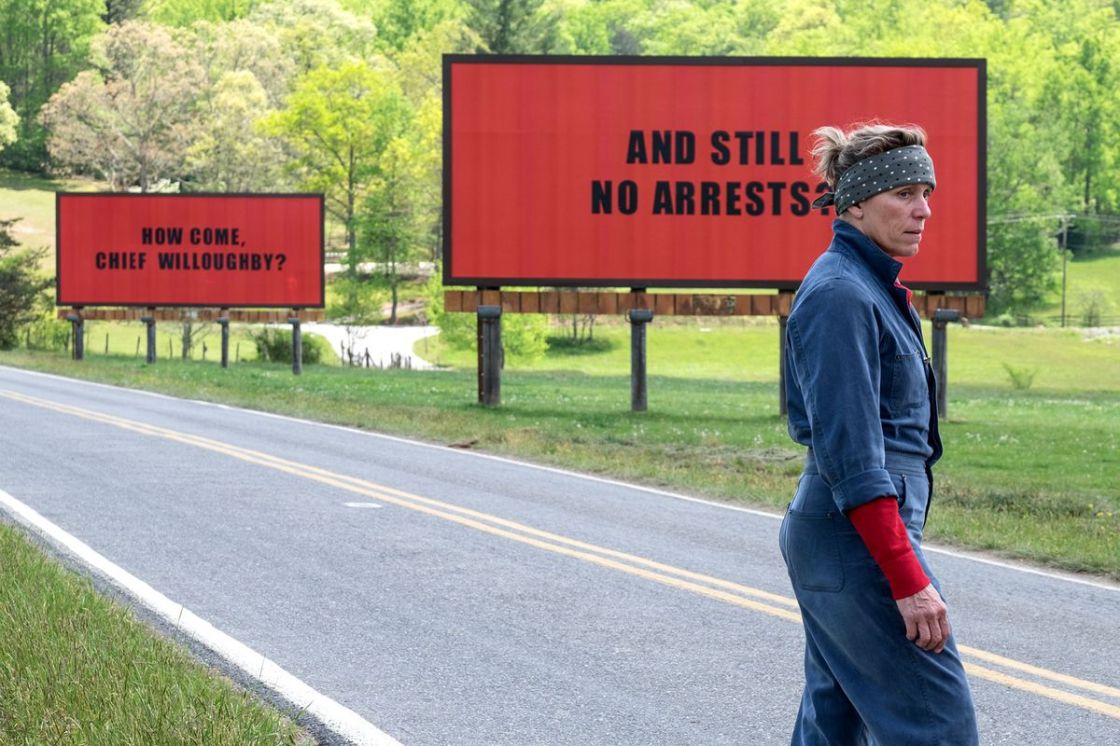“That’s right, I’m Angela Hayes’ mother,” Mildred Hayes grimaces in her first major scene of the Three Billboards Outside Ebbing, Missouri It’s the first real identifying fact we get about the lead character in Martin McDonagh’s latest release, that she is a relative of the victim of one of the most horrific pieces of violence the town has ever seen, and her place in that violence is perhaps the most important thing we learn about her.
Mildred (played by an insanely, career-best brilliant Frances McDormand) is on a mission – to get justice for her daughter, Angela, who was raped, murdered, and burned several months prior to the beginning of the movie. The three billboards of the film’s title refer to the trio of advertising banners she buys out to demand the cops take action on the case, and form the central premise for the chaos that echoes out from Mildred’s hunt for an end to her daughter’s murder.
It’s an excellent achievement in filmmaking, that much is unarguable – from the superb performances, to the stark direction, to the gallows humour that keeps the whole thing from getting bogged down in it’s own horribleness, Three Billboards is deft and bright and challenging in a way that I haven’t seen in a long time. Put it this way: it’s the cheeriest movie to feature the words “RAPED WHILE DYING” on-screen multiple times.
Three Billboards is a cowboy movie, of sorts, at least as far as Mildred’s story is concerned; many of the hallmarks of the genre (the lone, hard-nosed family member seeking justice against a corrupt law enforcement agency, committing acts of violence where she feels she has to in order to push that crusade forward) give the movie some identity and place it in the wider movie world, which helps as it’s really an engagingly chaotic mess of comedy, drama, tragedy, crime movie, and social commentary. But, unlike the cowboy movies of yore, there’s no easy ending, no justice immediately served. Instead, Three Billboards opts to tell a deeper story about the cycles of violence that spring from and are the cause of attacks like the one Angela is victim of, and that’s what makes it so compelling.
At the centre of these cycles is Sam Rockwell’s character, policeman Jason Dixon; for all the controversy surrounding his depiction, it’s him who props up the biggest theme Three Billboards has to offer. At the start of the movie, he is a washed-up alcoholic, a racist, homophobic fuckhead using his power as a small-town cop to act on his bigotry whenever he gets the chance; this continues after his mentor, police chief Bill Willoughby (an excellent, blunt, bittersweet Woody Harrelson) kills himself to escape his impending death by cancer, when he viciously attacks an innocent townsperson involved with the erecting of the billboards directly criticizing the chief. Even his attempted redemption sees that cycle of violence continue, with Dixon simply turning it on himself, allowing himself to be beaten senseless by a crowd of guys he believes were involved with Angela’s murder in order to collect evidence. It’s not until he finds himself in hospital with the man he attacked that the cycle finds an end – instead of taking the opportunity to harm Dixon the way Dixon harmed him, the man instead offers him a drink of orange juice, offering decency instead of the brutality that is the only method of problem-solving Dixon has known his entire life through. It’s a small change for him, but it’s a start, a spark of who he could be without the all-too-easy violence he has turned to all his life.
It’s a fantastically articulated performance from Rockwell, and those ideas – that someone has to actively go out of there way to put a stop to violence that poisons communities like Ebbing – are more relevant now than ever. From Mildred confronting her violent ex-husband and demanding that he treat his new girlfriend better, to Dixon and Hayes driving off into the sunset together as they uncertainly join forces against another violent offender, the movie doesn’t offer easy answers but it does offer something in the way of redemption for the people lost to violence at it’s core, hope in the face of an often-hopeless story.
Three Billboards isn’t my favourite of the Oscar-nominated movies this year (Lady Bird cinches that spot), but it’s an ambitious and intelligent bit of filmmaking and gives it’s star-studded cast a series of challenging roles to explore. And for that alone, it deserves your attention.
If you enjoyed this post and want to see more stuff like it, please consider checking out the rest of our Oscar Season series, where we’re reviewing all the Best Picture nominees, and consider supporting us on Patreon!
(header image courtesy of Vox)

Reblogged this on The Cutprice Guignol and commented:
A timely movie explores the cycles of violence that poison communities, and searches for a way out of them.
LikeLike